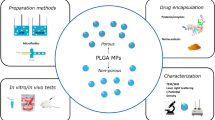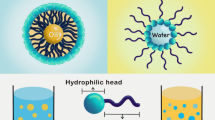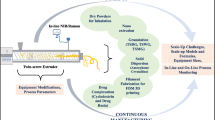Abstract
An accelerated method to evaluate peptide release from poly(dl-lactide-co-glycolide) (PLGA) depot formulations in short time is described. Peptide-loaded microspheres were made from hydrophilic 50∶50 PLGA by a dispersionsolyent extraction technique, and peptide release was studied at 37°C and at higher temperatures in various media. For all accelerated conditions, release was faster at temperatures above the glass transition, Tg, of the host polymer. Complete release of peptide from 8600 MW PLGA was achieved in 35 hours at 50°C in buffered and nonbuffered media containing 0.5% polyvinyl alcohol (PVA). Type of release media and concentration of PVA influenced the release profiles. A PVA concentration of 0.1 to 0.5% was found to prevent aggregation of microspheres at higher temperatures, with an increase in release at the higher PVA concentration. Peptide release was associated with a reduction of pH of the releasing media and increased mass loss. Complete peptide release at pH 4 from 8.6 kd and 28 kd PLGA at 50 and 60°C occurred within 30–40 hours and correlated well with the real-time release at 37°C and pH 7.0. At the higher molecular weight, a slightly longer accelerated release time and higher temperature were required to correlate with the real-time release. The data suggest that by optimization of release conditions such as temperature, surfactant concentration, buffer component, and pH, an accelerated study could be employed to evaluate depot formulations for a given polymer type.
Similar content being viewed by others
References
Holden C. Drugs and biotechnology. Science. 1994;248:964.
Okada H, Heya T, Ogawa Y, Shimamoto T. One month release injectable microcapsules of a lutenizing hormone-releasing hormone agonist (leuprolide acetate) for treating experimental endometrosis in rats. J Pharm Exp Ther. 1988;244:744–750.
Walker KJ, Turkes AO, Turkes A, Zwink R, Beacock C, Buck AC, Peeling WB, Griffiths K. Treatment of patients with advanced cancer of the prostate using a slow-release (depot) formulation of the LHRH agonist ICI 118630 (Zoladex). J Endocrinol 1984;103:R1-R4.
Eldrige JH, Staas JK, Meulbroek JA, Tice TR, Gilley RM. Biodegradable and biocompatible poly(dl-lactide-co-glycolide) microspheres as an adjuvant for staphylococcal enterotoxin B toxoid which enhances the level of toxin neutralizing antibodies. Infect Immun. 1991;59:2978–2986.
Bergsma JE, Rozema FR, Bos RR, Boering G, de Bruijn WC, Pennings AJ. In vivo degradation and biocompatability study of in vitro pre-degraded as-polymerized polylactide particles. Biomaterials. 1996;16:267–274.
Aso Y, Yoshiyoka S, Wan Po L, Terao T. Effect of temperature on mechanisms of drug release and matrix degradation of poly (D,L-lactide) microspheres. J Control Release. 1994;31:33–39.
Kaniwa N, Shameem M, Katori N, Aoyagi N, Kojima S. The suitable temperature for the evaluation of controlled release products in vitro. Pharmazie. 1995;50:53–55.
Cha Y, Pitt CG. The acceleration of degradation-controlled drug delivery from polyester microspheres. J Control Release. 1989;8:259–265.
DeLuca PP, Mehta RC, Hausberger AG, Thanoo BC. Biodegradable polyesters for drug and polypeptide delivery In: El-Nokaly MA, Piatt DM, Charpentier BA, eds. Polymer Delivery Systems, Properties and Applications. ACS Symposium Series 520. Washington, DC: American Chemical Society, 1993:53–79.
Shameem M, Lee H, Burton K, Thanoo BC, DeLuca, PP. Effect of-irradiation on peptide-containing hydrophilic poly (d,l-lactide-coglycolide) microspheres. J. Pharm Sci. Tech. (1999). In press.
Mehta RC, Thanoo BC, DeLuca PP. Peptide containing microspheres from low molecular weight and hydrophilic poly(d,l-lactide-co-glycolide). J Control Release. 1996;41:249–257.
Okada H, Doken Y, Ogawa Y, Toguchi H. Preparation of three-month depot injectable microspheres of leuprorelin acetate using biodegradable polymers. Pharm Res. 1994;11:1143–1147.
Park TG, Lu W, Crotts G. Importance of in vitro experimental conditions on protein release kinetics, stability and polymer degradation in protein encapsulate poly (d,l-lactide-co-glycolide) microspheres. J Control Release. 1995;33:211–222.
Mader K, Gallez B, Liu KJ, Swartz HM. Non-invasive in vivo characterization of release processes in biodegradable polymers by low-frequency electron paramagnetic resonance spectroscopy. Biomaterials. 1996;17:457–461.
Author information
Authors and Affiliations
Corresponding author
Additional information
Published: July 21, 1999.
Rights and permissions
About this article
Cite this article
Shameem, M., Lee, H. & DeLuca, P.P. A short-term (accelerated release) approach to evaluate peptide release from PLGA depot formulations. AAPS PharmSci 1, 7 (1999). https://doi.org/10.1208/ps010307
Received:
Accepted:
Published:
DOI: https://doi.org/10.1208/ps010307




